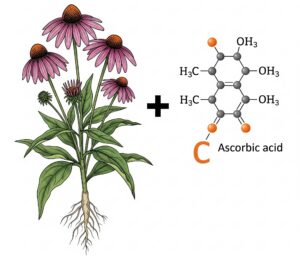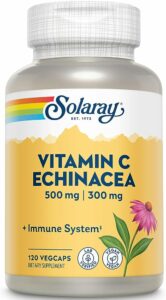Both Vitamin C and Echinacea root are popular for their potential immune-boosting properties. When combined, they are often marketed as a synergistic duo for supporting overall health, particularly in the context of common colds and upper respiratory infections.
Here’s a breakdown of the purported health benefits:
Individual Benefits:
- Vitamin C (Ascorbic Acid):
- Immune System Support: Vitamin C is a well-known antioxidant that plays a crucial role in various immune functions, including supporting the production and function of white blood cells.
- Antioxidant Action: It helps protect cells from damage caused by free radicals, contributing to overall cellular health.
- Reduced Cold Duration and Severity: Some research suggests that regular vitamin C supplementation can modestly reduce the duration and severity of common cold symptoms.
- Echinacea Root (e.g., *Echinacea purpurea*):
- Immune System Stimulation: Echinacea is believed to stimulate the immune system by activating immune cells like macrophages, neutrophils, and natural killer cells.
- Anti-inflammatory Properties: It contains compounds that may help reduce inflammation in the body.
- Common Cold and Flu Symptoms: Traditionally used to shorten the duration and reduce the severity of common cold and flu symptoms, such as sore throat, cough, and fever. Some studies support its potential to reduce the odds of developing a cold.
- Antiviral Effects: Laboratory and animal studies suggest it may have antiviral effects.
Synergistic Potential of the Combination:
While both ingredients individually contribute to immune health, some argue that combining Vitamin C and Echinacea root may offer enhanced or synergistic benefits.
- Enhanced Immune Response: The idea is that Vitamin C’s role as an antioxidant and its support for general immune function, combined with Echinacea’s direct immune-stimulating effects, could provide a more comprehensive approach to bolstering the body’s defenses.
- Comprehensive Cold Support: Many commercially available immune support supplements include both Vitamin C and Echinacea (often alongside other ingredients like Zinc). These combinations aim to tackle various aspects of cold and flu symptoms, from supporting the immune system to reducing inflammation and viral replication.
- Support for Physical Barriers and Innate/Adaptive Immunity: A review of studies suggested that Vitamin C, along with Echinacea, Vitamin D, and Zinc, can help boost immune system barriers involved in fighting the common cold, including physical barriers, innate immunity, and adaptive immunity.
Research and Considerations:
While the combination is popular, it’s important to note:
- Varying Research Results for Echinacea: The efficacy of echinacea for preventing or treating the common cold remains somewhat controversial in scientific literature, with some studies showing benefits and others showing less conclusive results. This can be due to differences in echinacea species used, plant parts (root vs. aerial parts), preparation methods, and study design.
- Synergy Needs More Dedicated Research: While individual benefits are established to some extent, extensive research specifically on the synergistic effects of *combining* Vitamin C and Echinacea root in humans is still developing. Some studies on multi-ingredient immune formulas containing both have shown promise in reducing the severity and duration of common cold symptoms, but it’s hard to isolate the exact contribution of each component.
- Dosage and Quality: As with any supplement, choosing a high-quality product and adhering to recommended dosages is crucial. The optimal dosages for both ingredients can vary.
- Consult a Healthcare Professional: It’s always advisable to consult with a healthcare provider before starting any new supplement regimen, especially if you have underlying health conditions or are taking other medications, as Echinacea can interact with certain drugs (e.g., immunosuppressants).
In summary, combining Vitamin C and Echinacea root is a popular strategy for immune support, particularly for mitigating the common cold. While both have established roles in immune function, the synergistic benefits of their combination are an area of ongoing interest and research.



Leave a Reply